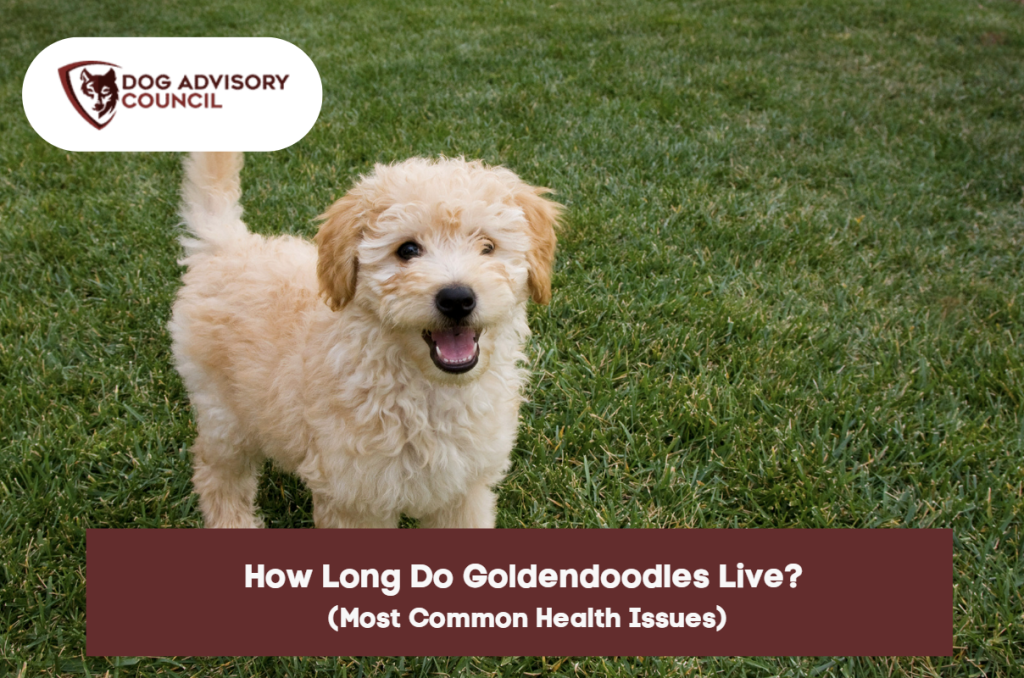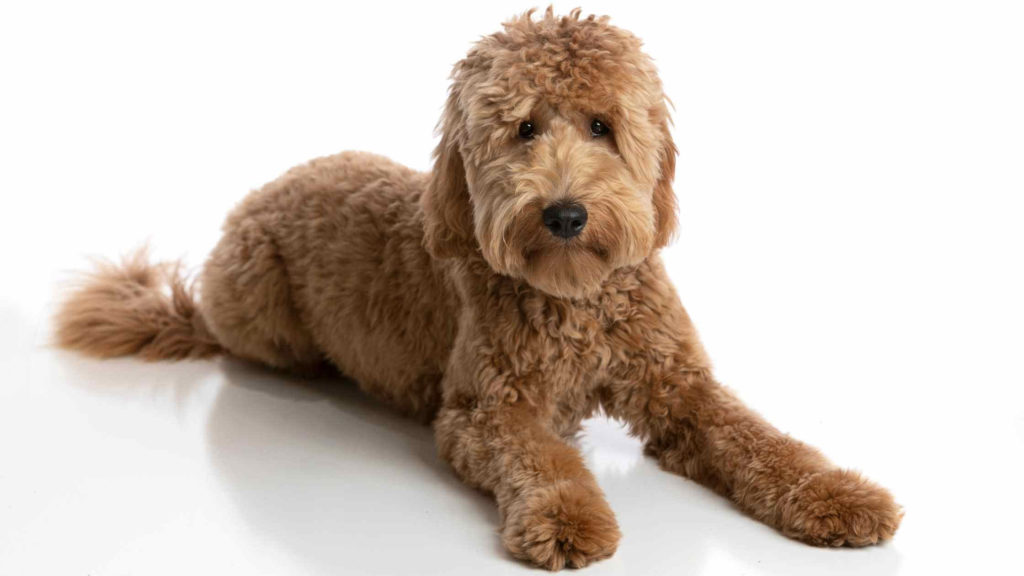
A true family-friendly dog breed. Here you’ll learn everything you need to know about how long do Goldendoodles live and how to make the absolute most out of their golden years!
The expected lifespan of a Goldendoodle is between 10 to 15 years, and the size of your Goldendoodle will relate to his expected lifespan.
If you have a mini Goldendoodle, he’ll live longer, and if he is larger, he may live shorter. Most larger dog breeds will live shorter lives than medium or smaller dog breeds simply due to physical conditions.
Many factors can impact the breed’s expected lifespan, but this average lifespan is very common.
You’ll also want to get familiar with common lifespan factors, as well as what their cause of death is and how to make the most out of those exciting years with your pooch. So, keep reading.
Common factors affecting Goldendoodles’ average lifespan
Just like any dog, some important details can go into the lifespan you can expect for your Doodle in particular.
If you’re aware of them, you can use them also to enhance your dog’s quality and longevity of life (more on that later).
Unlimited claims, No credit checks, No upper age limit & Multiple pet discounts
Compare the best rates on pet insurance
Genetics
As you likely already know, Goldendoodles are a crossbreed between the Golden Retriever dog breed and the Poodle dog breed. This combination results in a commonly curly pooch with some great tendencies.
However, genetics play a role in lifespan as much as they do in the aesthetics of your Doodle.
A pooch with more poodle in him will have a longer life expectancy than his brother, who may have more Golden Retriever in him.
This genetic percentage will accurately determine lifespan since Goldens have shorter lifespans than poodles.
Also, both parents’ general health and longevity will have a strong link to your Doodle’s lifespan.
Suppose both come from parental lineages with long life expectancy and complication-free lives. In that case, your pup can often expect the same — all the more reason to be particular on your choice of the breeder for your Goldendoodle puppy.
Also, Goldendoodles exhibit what’s known as hybrid vigor. It is the tendency of crossbred animals to show exceptional vigor and out-perform both parents in physical fitness, fertility, and survivability.
Activity level
Since your Doodle is a combination of two high-energy dogs, you can expect him to be very active.
However, a pup needs to maintain good physical health throughout his life also to make sure that his body stays strong and sturdy for those more challenging years as he ages.
A dog with a good level of activity will have an easier time keeping his weight under control. Dogs who are obese will commonly die earlier than healthy ones.
Staying active is also important for mental wellbeing, which greatly impacts your Goldendoodle’s lifespan (more on that later as well).
All in all, keeping your Doodle active every single day has a huge role in his overall quality of life and lifespan.
Allergies
Much like both parent breeds, Goldendoodles can often have allergies to fillers used in dog foods. These can include soy, wheat, and corn.
Since allergies aren’t always easy to identify, they could be suffering from allergic reactions for a while before you notice. This will impact the body’s strength over time.
Ear infections
Because of their long and flappy ears that often don’t get a lot of exposure to the fresh air that is responsible for keeping them dry and healthy, Doodles are known for ear infections.
Left undetected or untreated, especially if they are chronic and painful, these can impact their overall lifespan.
Hip dysplasia
Hip dysplasia happens when the joint connecting the leg to the hip doesn’t fit properly, causing pain and discomfort when standing, sitting, moving, and more.
This is a painful condition that can often end a Doodle’s life if it gets to be too long-term and painful as he ages.
Von Willebrand’s disease
This is a disease that impacts a dog’s ability to clot blood. Since clotting blood is crucial for helping the body recover from an injury, a dog who is injured and has Von Willebrand’s disease will have a strong likelihood of bleeding out because he is unable to form clots.
Progressive retinal atrophy
Most animals (including humans) have difficulty with the eyes as seniority approaches, and Doodles are prone to progressive retinal atrophy, in particular.
This is when the cells degrade and die out, causing a doggo to lose his sight, particularly in those high-lit situations (such as daylight). This can often set in early, in adulthood.
What do most Goldendoodles die of?
It’s hard to talk about, but Goldendoodles have common causes of death, just like every other pooch. Let’s just grit our teeth and get through this part, okay?
Bloat
Bloat is when a dog’s stomach swells up and causes a lot of digestive problems. While it is often mild in humans, it can be serious in dogs.
Since they can’t eat comfortably, they can often suffer from lack of nutrition, and this will cause decline and death in many cases for a Doodle.
Cancer
Goldendoodles are prone to lymphoma (cancer in the lymph nodes) or osteosarcoma (bone cancer). This is often because they have larger bodies and bones, and there is more susceptibility to both of these cancers.
These often lead to a Goldendoodle crossing over the rainbow bridge after succumbing to its complications. This is especially common as he gets older.
Thyroid problems
A Goldendoodle dog can deal with hyperthyroidism or hypothyroidism in his lifetime, which can create many problems, including heart complications and even nerve damage.
While it can often be managed with medication, it can be difficult for a vet to diagnose because most symptoms appear mild to most dog owners (more on that later).
Heart disease
While they may have a big heart, Goldendoodles can have all sorts of cardiovascular problems all the same.
Heart health problems are especially common in poodles, so it makes sense that a Doodle may have the same likelihood.
That was rough, huh? You’ll be glad to know, though, that none of these necessarily mean a death sentence!
Below, we’ll get familiar with how to properly give your dog the best chance at a healthy and happy life for as many years as possible. The good news is that it is easier than you think!

How to extend a Goldendoodles’ lifespan naturally
Most of the information out there to help your Goldendoodle have a longer life expectancy is about preventative health.
Just like with humans, living healthily in all of the ways will give them the best chance at a longer life with minimal pain and disruption even as they get into their golden and twilight years.
Source your Goldendoodle carefully
Firstly, you will want to ensure that you are adopting or purchasing your Doodle from a reputable breeder that prioritizes breeding responsibly with healthy, thoroughly vetted puppies.
You don’t want to fall into the trap of buying a Doodle from a backyard breeder, puppy mill, or pet store where the parents were not properly cared for and came from questionable backgrounds.
These breeders generally have little to no interest in the health and well-being of their doodles, only seeing them as dollar signs.
The better the genetics of your Goldendoodle puppy, the better chance that you will be having a better and easier way of life for him long-term. The healthier the parents are, the healthier the pup will be in most cases.
Diet
Goldendoodles will need a properly balanced diet that will be healthy and designed to strengthen all parts of their body preventatively. You’ll want to get a vet-recommend brand of dry kibble, and it should be rich in protein and fat.
Also, focus on dental health, as dental hygiene can have a serious impact on your pup’s ability to live a healthy life and get the proper dog food needed to survive and thrive.
Start as soon as you welcome your Goldendoodle puppy.
Prioritize mental health
Good quality of life goes beyond physical health. Much like Golden Retrievers, Doodles are prone to separation anxiety, and they are also very intellectual, meaning they get anxious and bored very quickly.
Goldendoodles need a lot of mental stimulation from you as a dog parent. Their mental health is a priority for your dog’s quality of life.
Train him on how to be alone (so that he is comfortable being alone if needed) and prioritize human-oriented games. You can find some great interactive games that will stimulate their brains and help them bond with you.
The more they bond with you and spend time being active emotionally, mentally, and physically (ideally, all three at once), the better their overall health will be.
Since your Doodle can easily get distressed and depressed, you owe it to him to have lots of fun!
Physical health should be a priority
On the physical side, you’ll want to help him enjoy being active through play, hiking, swimming, and anything else that you can do to help him stay active every single day.
Your Doodle will not only be satisfied, but he’ll also have stronger bones and muscles and a very strong cardiovascular system — crucial for those that have sensitivities in their systems.
Keep working with your vet regularly for immunizations and sterilization
To neuter or spay them helps Goldendoodles’ overall health and comfort in their later years.
When it comes to immunizations, they prevent health problems in your pooch and make their immune system stronger.
Finally, regular health checks and a good relationship with a vet means that you and they can catch health conditions sooner rather than later, which is always good for your Goldendoodle.
While it’s scary and hard to talk about a Goldendoodle’s lifespan, it’s also important to understand so that you can make the most out of your time together, hopefully as many healthy and happy years as possible!
Unlimited claims, No credit checks, No upper age limit & Multiple pet discounts
